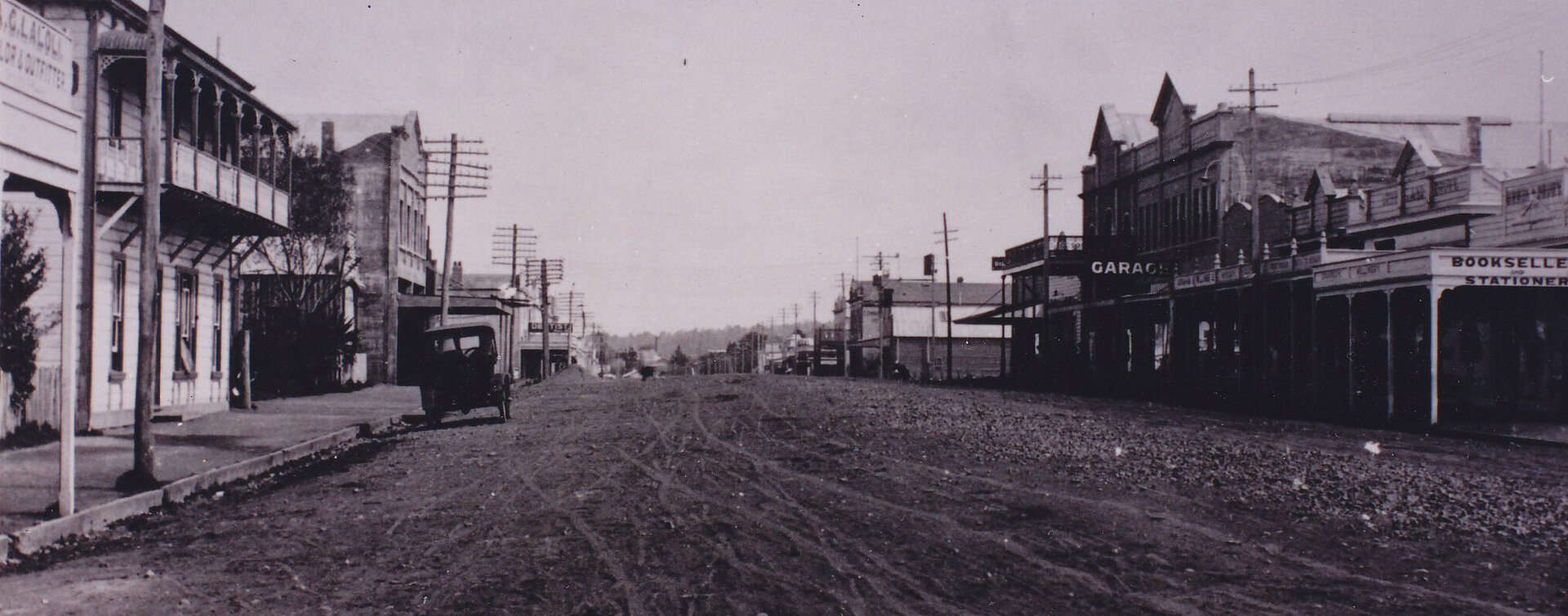Recollections of Raetihi by Ngairi Shout
The small, north island town of Raetihi, situated on the high country of the central plateau, might well be the eye of the ika, which according to Māori folklore, was hooked up from the sea by the legendary Maui. It was in this town with a population of about one thousand that I spent my early years. I was one of three girls and with very caring parents, we were a secure and happy family. We lived in the shadow of Mt Ruapehu in a bracing climate and with unpolluted air. The winters were very cold, and I well remember the family bustling off to Mass on freezing mornings when icicles hung along the roadside like skeleton’s teeth. I think we did our penance in the church as we slowly froze from the knees down as no such luxury as a heater in a church those days!
However, there was a magic about the place in the summer months when we played hide-and-seek up in the trees, swung over the river on supplejacks and dressed up in our mother's old clothes. Happy days, indeed! Modern youth would laugh at our naive and unsophisticated way of life lived at a slow tempo but free of hang-ups. No one was at risk, and we could walk in the streets unmolested. On warm summer nights we slept with our doors open. I doubt my parents were the owners of a house key.
When the local gaol was unoccupied, the policeman's daughter and I took advantage of the situation and spent happy hours playing house within its walls.
In our primary school days, before the installation of a swimming pool, it was the custom on hot days to hurry home from school, snatch a swimsuit and hasten to the river. There seemed to be an unwritten rule that the first male arrival at the river was responsible for the lighting of a small fire on the stones. Although we enjoyed our swim, we came out of the water, a gang of kids, almost blue with the cold and stood around the fire to warm up.
The water was very cold fresh from the snows of Mt Ruapehu.
We travelled daily by bus to Ohakune, a distance of about twelve kilometres, for our secondary education.
Mind you, I was no scholar and always in strife. School seemed more for somewhere to eat my lunch. Part of my curriculum was playing the wag. I remember one really good day when three other girls and I walked along the railway line from the Ohakune station to the Hapuawhenua viaduct (from where the bungy jumping takes place today) and into a tunnel (now non-existent) where in a manhole we planned to await the arrival of a train. We groped our way into the tunnel which was curved and as black as a coal cellar. We felt our way into a manhole and after a lengthy wait a long freight train rattled through. The locomotive was steam driven and in the confined space we were almost choked by the smoke, to say nothing of the deafening noise. We emerged into the daylight looking like chimney sweeps. I never knew how my parents found out about our adventure but when they did, I tried not to exist ... did I get "what for"!
Another suitable place for playing wag was in an empty house with a "To Let" sign, quite a common sight these days. It was no problem to push up the window and climb in and as there was always plenty of firewood around, we soon had a cheery fire going. On these occasions we came well prepared with an outsize lunch and a pack of cards.
My father was in business as a men's hairdresser and tobacconist and during the Depression years it was quite common for the local farmers to run up accounts and later meet their commitments with such commodities as a sack of pumpkins, some firewood or half a sheep. A wonderful attitude prevailed towards one's neighbour during those frugal years; money and food were scarce but everyone shared what they had.
Our house was on the main highway and many a swagman out of work called for a meal on his way going either north or south in the hope of finding a job.
Raetihi was the centre of a sawmilling as well as a farming district, but over the years when large tracts of bush were milled out farming was much more in evidence.
The Punch family were well known in the district and were people of means; pioneers who arrived there on horseback before the advent of roads or railway and who worked long and hard hours. They owned the local picture theatre, sawmill, farms, and hotel, a dry hotel, I might add, as the King Country was definitely a no grog area. It was little wonder that our young sister had her version of the creed when saying her prayers as her interpretation was "Punch's Pilate".
My father was very community minded and was active for many years as a borough councillor. He also served terms as mayor and deputy mayor. As he was the shootin', huntin' and fishin, type he was an honorary ranger for the Acclimatisation Society. That meant being on the lookout for any crafty guys planning to shoot a wild pigeon or tickle a trout.
Life was never dull as our community involved itself in such activities as drama and music, balls, concerts, and flower shows, as well as a variety of sports and that included tramping, skiing and fishing. A popular event on the social calendar was the annual A & P Show when the whole town turned out, especially the young women, to see heroic farmers’ sons showing off their skills at steer riding or horse jumping events. Shops did good business prior to this function as all women arrived complete with hats and gloves.
The ball which was held on the night of the show was always well attended, when everything was carried out with flair and panache. Women were elegantly gowned in rustling silks or satins and men in tuxedos. As well as being a very grand occasion, it was also a very boozy affair. Everyone arrived well stoked. There were ways and means of keeping well stocked liquor lockers in a no licence area. Many good stories were told of the sly grog days and the one I like is about the businessman who had liquor sent to him by rail and labelled "Drapery". The consignment suffered a mishap somewhere on the way and the man received a telegram from the railways department which read, “Drapery Leaking”.
In recent years, this once thriving town has suffered from the nationwide economic downturn and as a result many business people have been obliged to close their doors. The main street now has many empty shops, while the Post Office and bank are non-existent. Many people have left the district and no doubt the majority would be looking for better job opportunities. Sad, indeed, for I well remember those Freeman R. Jackson sale days when the town was bustling with business.
While the farmers made their bid for stock at the saleyards, their wives were shopping in the main street and business was brisk even if wool did sell at one shilling and three pence an ounce and cotton at fourpence halfpenny per reel.
In that cold climate people spent generously on blankets, warm, woollen clothing and footwear.
I do wonder about the future of Raetihi, but I think its potential now lies within its environs. For those seeking adventure and outdoor pursuits there is Ruapehu at close proximity for tramping and skiing, the Whanganui River for rafting and canoeing and, not too far away, is the Bridge to Nowhere; all very attractive wilderness areas.
In conclusion, there is much I could write about the old hometown, but I think the important factor is that we grew up in good years when there was concern for people and moral values. In today's society much higher value is placed on material gains in a whole new lifestyle. Who knows, we may go the full cycle and one day Raetihi may become that thriving country town we once knew. I would like to think this could happen but, nevertheless, I still love to visit the old home town so full of happy memories.
NGAIRI WAS, - DAUGHTER OF TOM SHOUT, LONG TIME RESIDENT OF RAETIHI





